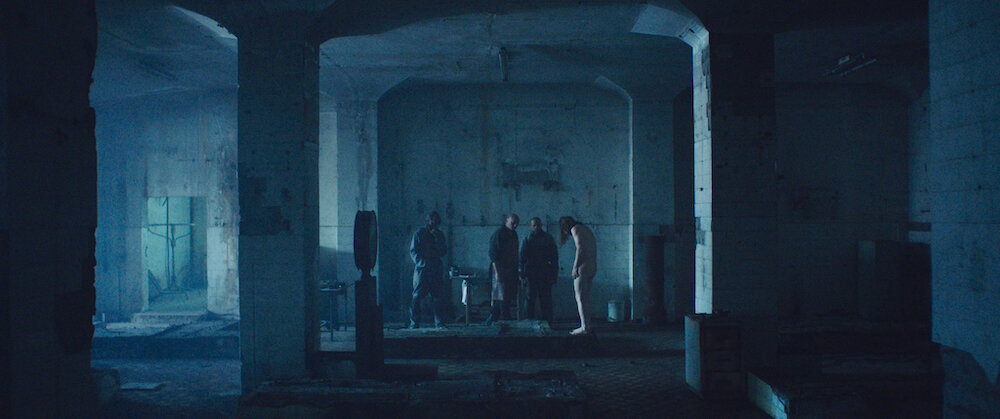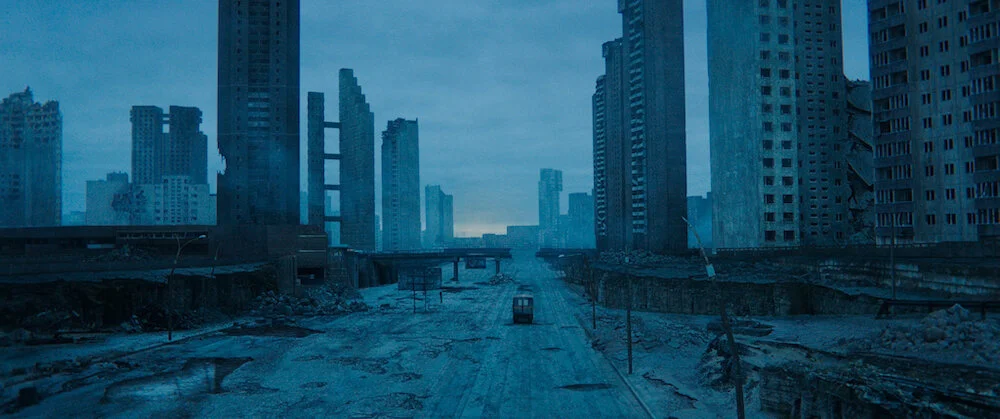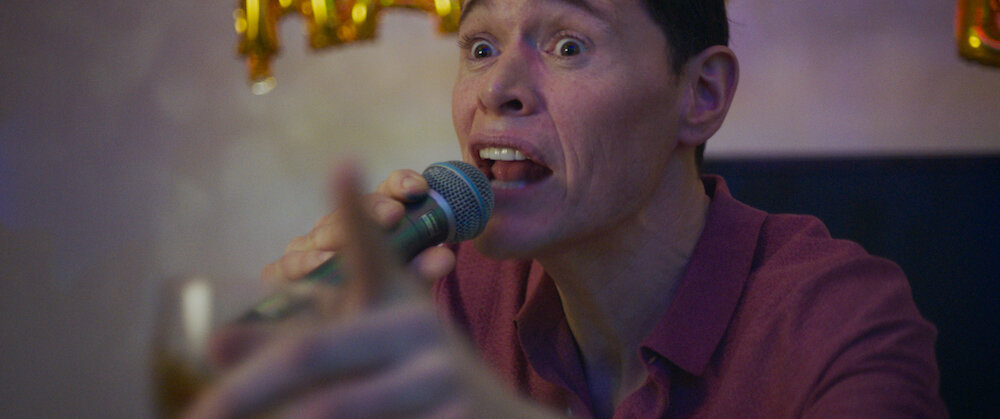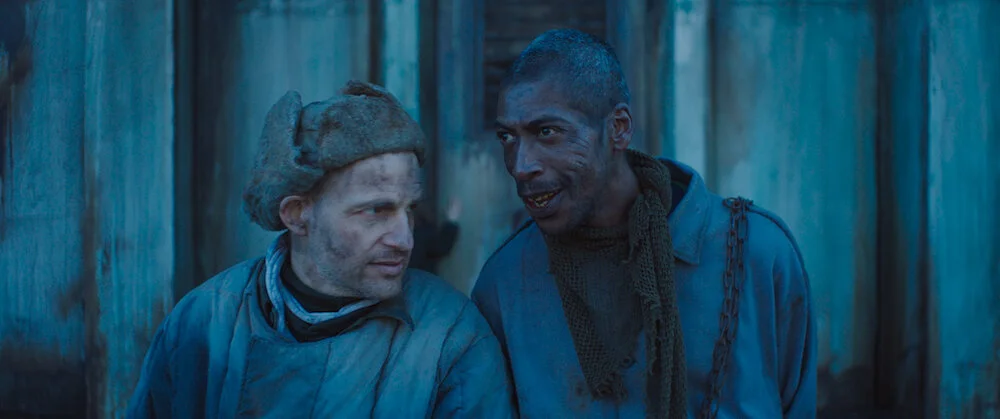[Editorial] Director Chino Moya talks dystopian sci-fi horror Undergods (2020)
Undergods is an intriguing bundle of tales, each presenting a slightly different view of a dystopian Europe. Recently I had the pleasure of spending half an hour with writer-director Chino Moya, discussing the film and related topics.
Chino had made a number of short films previously, as well as music videos. “Exactly,” said he “and some TV commercials, to make money.” I had to ask how on Earth he went from that background to a full feature with BFI backing. “I became a director to make features, but it’s not easy to get the money. You cannot do it on your own. I tried for many years, couldn’t get the funding, and in the process ended up doing everything but make films: music videos, commercials, documentaries, and all sorts. Then finally, I had a script that I was developing with producer Sophie Venner, and we submitted it to the BFI, and they said yes! So OK! It’s true that we built some form of momentum: we both knew we were going to make that movie. It was the first time in my life that I had known I was going to make this, no matter what; if I had to make it with my iPhone, I’m going to make it with my iPhone, though I’d try first with other avenues. Maybe that element of determination helped for people to trust that this was reality. Not only the BFI got on board, but also Ridley Scott’s company – they gave us some funding for developing the movie – we got a few co-producers from other countries in Europe. It was an interesting journey, and interesting to see how many people wanted to participate, especially considering it was a first film, and a film of an unusual nature.”
Talking of that “unusual nature”, I asked Chino about the films that influenced Undergods. “So there are many, very diverse influences, a mixture of high and low. I watched a lot of horror films as a kid – I’m from Spain, and it was considered a genre for kids there – it was normal for us at age six, seven, eight, to watch The Exorcist, The Shining, all the horror cannon. I read a lot of horror literature too. Oh and I was obsessed with anthology horror and fantasy, like Creepshow and The Twilight Zone. There was a movie which influenced Undergods a lot, which was called Xtro: a British film from the early eighties. I saw it in the cinema with my Dad, and then again when I was making Undergods: it had a massive influence. A lot of science-fiction films had an influence too, like Soylent Green, obviously Bladerunner, all sorts. Then there are those arthouse films that I got into during my teens, like those by Pasolini, Fassbinder, Vittorio De Sica. We used some with the crew to generate the dark view of the world, like Zulawski’s Possession, De Sica’s Miracle in Milan. Then there was Safe by Todd Haynes. As for contemporary films, there’s an Austrian director I like called Ulrich Seidl; he’s as bleak as Hanneke, and as Austrian, but with a sense of humour.”
Interestingly, out of all those truly diverse influences, Chino had not mentioned the one that came to mind when I watched Undergods, due to its large scale interiors: Gilliam’s Brazil. Also, one of our editors had wondered if Chino had been inspired by György Palfi's Taxidermia (2006); she felt that the narrative construct along with depressing dystopian setting feels like it could be an accompaniment piece. “I didn’t mention Brazil with the crew, possibly because it is so out there, with sort of a comedy element to it: as much as it no doubt had some influence, I was wary of the crew trying to make something that looked so satirical. Bear in mind the world in Brazil was completely made up: I needed a world in Undergods that was grounded in reality. And I’ve seen Taxidermia, yes: it surely was in the back of my mind. There is a strong eastern European texture to Undergods, and I’ve been influenced by films, books, aesthetics from there, including certainly Taxidermia. And I cannot forget Roy Andersson, another huge influence who made up his own worlds.”
Turning my attention more closely to Undergods itself, I asked about what that satire represented: is it a skewed view of the world we are currently living in, our disdain at authority, mistrust for our leaders, or did Chino have something else entirely in mind? “Obviously my idea was always for people to make whatever they wanted from the movie, but for me, yes it is a comment about society; a comment about this man made world. Societies are made based on ideas, but they don’t work when you put them into practice. We create places that just don’t work, and they only benefit a few. There’s an element of broken or toxic masculinity in the film, and all the utopias that the film talks about (capitalism, communism, fascism) are seen as almost science fiction.”
I really appreciated that the majority of characters in Undergods were at least middle aged, and I asked Chino whether that was deliberate, or simply the way the stories turned out. “I think people in middle age are at a time when they have reached some type of stability: they know who they are. When you are twenty or thirty, there are still different avenues open to you; but when you are the age of the characters in Undergods, it feels like that’s it: this is who you are. These characters have stagnant lives, and many people at that age recognise there are not going to be any major changes to come in their lives. There’s a sense that hope just isn’t there anymore; they live lives that are pretty much regimented or dictated by the systems they live in, and they don’t have much control over their routines. Those characters haven’t got much left to look forward to unless they make a dramatic change, because the lives they’ve chosen to live don’t allow for much variety. When they get to that age, it’s like fifty more years with the same mind-numbing routines.”
I’m not sure I liked his view of aging. “Oh it’s just those characters. I’m not much different to that age myself. My Dad is eighty-five and he’s like a teenager still. The characters in Undergods don’t have much expectations, but there are alternative lifestyles. My hope with Undergods is that people will see it and see that they don’t need to end up like these people. So weirdly enough, there’s an optimistic message: you can do anything you want in your life, not just what is expected of you like these middle-class, middle-age Western humans in the film. I want to invite people from all places and ages to reconsider their lives. In a way, COVID has been great for that, prompting us to think about what we want to do.”
Whatever it is, the way you tell your story online can make all the difference.
Chino’s mention of the optimistic feel to the film prompted me to wonder whether that might have been helped by the open-ended nature of some of the stories. I asked why he had left them so inconclusive. “I didn’t want Undergods to be a ‘traditional’ anthology film, I wanted it to feel like one journey through different worlds and stories instead of a collection. So it felt better not to conclude some of the stories; for example, the one in the middle has a second act that doesn’t properly reach its third act. I wanted to play with that idea of stories that don’t quite finish, so the movie will flow from the beginning to the end, rather than having to stop and start with each segment. I read Ovid’s Metamorphoses which was a collection of a hundred and fifty stories, and each one would morph into the next; and I think that’s what I tried to mimic.”
Another thing which helped Undergods positive mood, in contrast to the content of the film, was the music. I asked Chino what prompted him to choose composer Wojciech Golczewski, who usually writes for horror films. “I knew that I wanted a synth electronic soundtrack, with a late seventies/early eighties vibe; I was playing a lot of German electronic music when I was preparing Undergods and I thought that was the vibe. After doing a lot of research, I came across Wojciech, a synth wizard, and someone who understands those sounds as well as being a great composer. He was perfect for it.”
Whatever it is, the way you tell your story online can make all the difference.
Undergods is due to be released on 17 May. “I can’t wait,” said Chino. “So far, it has only been seen by industry people, people in festivals or journalists. So all I know is what people in the industry think of Undergods and I’d like to hear what people who have no relationship with the film industry think about it. So this is a very important moment for the movie and for me: it’s going to be finally exposed to the outside world. I hope they’ll see that they can make their world less bleak than it is in the film, and that we can actually work together as a community to make things better. But my number one hope is that people will feel entertained. If I can convey an idea, that’s good, but for people to feel they have had an hour and a half well spent is even better. It will give them a window into another world, a world to prevent or avoid.”
I asked Chino what is coming next. “Lockdown was great for writing. I have a couple of scripts: an alternative British history sci-fi, taking place in London; and a post-pandemic horror. So I hope one of those will get off the ground not long from now.”
More intriguing variety to look forward to.







![[Video] The Ghouls Gang Discuss Horror Films, Writing and Inspiration](https://images.squarespace-cdn.com/content/v1/5fe76a518d20536a3fbd7246/1649057279297-EJ6KXE11DGFQ5DZVVF0I/Screenshot+2022-04-04+at+08.27.46.png)
![[Editorial] Interview with Alessandra of A Gothic Cookbook](https://images.squarespace-cdn.com/content/v1/5fe76a518d20536a3fbd7246/1638223411521-5L2FSIN4W0FUO74Z6SZ9/Screenshot+2021-11-29+at+22.03.02.png)
![[Editorial] Director Rob Jabbaz talks all about horror film The Sadness](https://images.squarespace-cdn.com/content/v1/5fe76a518d20536a3fbd7246/1638222904875-Q06U39PYRCYQOS76L2Q8/Screenshot+2021-11-29+at+21.48.36.png)
![[Editorial] Director Alex Noyer talks all things Sound of Violence](https://images.squarespace-cdn.com/content/v1/5fe76a518d20536a3fbd7246/1638222347961-BGQ2QTCJYANK1HX6QM2I/Screenshot+2021-11-29+at+21.45.25.png)
![[Editorial] Spencer Charnas from Ice Nine Kills chats The Silver Scream 2: Welcome to Horrorwood](https://images.squarespace-cdn.com/content/v1/5fe76a518d20536a3fbd7246/1634804329235-3YKH2F04RIG1W00JQMLB/Screenshot+2021-10-21+at+09.17.15.png)
![[Editorial] The Horror of Found Footage: Discussing Found Footage Horror Films](https://images.squarespace-cdn.com/content/v1/5fe76a518d20536a3fbd7246/1633271557483-J2LUKKW4N8H8I4OFEQBJ/Screenshot+2021-10-03+at+15.32.06.png)
![[Editorial] Hex The Patriarchy: 25 Years of The Craft Discussion at Soho Horror Festival](https://images.squarespace-cdn.com/content/v1/5fe76a518d20536a3fbd7246/1625599083820-MUTZ5L59OAB0IWSJ1NHD/Screenshot+2021-07-06+at+20.17.42.png)
![[Editorial] Interview with Yfke Van Berckelaer director of horror short Lili](https://images.squarespace-cdn.com/content/v1/5fe76a518d20536a3fbd7246/1624988826781-BSO09UW2FWOH1Q4688ME/Screenshot+2021-06-29+at+18.46.48.png)
![[Editorial] Mental Health & Horror: Discussing Comfort In Fear](https://images.squarespace-cdn.com/content/v1/5fe76a518d20536a3fbd7246/1621100272960-SNRUHQF793NN8KMZCUZU/Capture%2B1.jpg)

![[Event Review] Saw the Musical: The Unauthorized Parody (2023)](https://images.squarespace-cdn.com/content/v1/5fe76a518d20536a3fbd7246/1697187791989-OYMGLZO193B7XEMTJYGR/Screenshot+2023-10-13+at+10.01.44.png)
![[Book Review] The Book of Queer Saints Volume II (2023)](https://images.squarespace-cdn.com/content/v1/5fe76a518d20536a3fbd7246/1697187383073-U78VOF5WVDHI9YE8M98A/Screenshot+2023-10-13+at+09.52.31.png)
![[Film Review] Sympathy for the Devil (2023)](https://images.squarespace-cdn.com/content/v1/5fe76a518d20536a3fbd7246/1697186986143-QDVLQZH6517LLST682T8/Screenshot+2023-10-13+at+09.48.52.png)
![[Film Review] V/H/S/85 (2023)](https://images.squarespace-cdn.com/content/v1/5fe76a518d20536a3fbd7246/1697455043249-K64FG0QFAFVOMFHFSECM/MV5BMDVkYmNlNDMtNGQwMS00OThjLTlhZjctZWQ5MzFkZWQxNjY3XkEyXkFqcGdeQXVyMTUzMTg2ODkz._V1_.jpg)
![[Film Review] Kill Your Lover (2023)](https://images.squarespace-cdn.com/content/v1/5fe76a518d20536a3fbd7246/1697465940337-T55VQJWAN4CHHJMXLK32/56_PAIGE_GILMOUR_DAKOTA_HALLWAY_CONFRONTATION.png)
![[Film Review] Shaky Shivers (2022)](https://images.squarespace-cdn.com/content/v1/5fe76a518d20536a3fbd7246/1696442594997-XMJSOKZ9G63TBO8QW47O/Screenshot+2023-10-04+at+18.59.33.png)
![[Film Review] Elevator Game (2023)](https://images.squarespace-cdn.com/content/v1/5fe76a518d20536a3fbd7246/1696440997551-MEV0YZSC7A7GW4UXM5FT/Screenshot+2023-10-04+at+18.31.42.png)
![[Book Review] Wylding Hall (2015)](https://images.squarespace-cdn.com/content/v1/5fe76a518d20536a3fbd7246/1695484930026-PFRK7O26SLME4JIC49EW/Screenshot+2023-09-23+at+16.59.04.png)
![[Film Review] A Wounded Fawn (2022)](https://images.squarespace-cdn.com/content/v1/5fe76a518d20536a3fbd7246/1695484054446-7R9YKPA0L5ZBHJH4M8BL/Screenshot+2023-09-23+at+16.42.24.png)
![[Film Review] Perpetrator (2023)](https://images.squarespace-cdn.com/content/v1/5fe76a518d20536a3fbd7246/1695483561785-VT1MZOMRR7Z1HJODF6H0/Screenshot+2023-09-23+at+16.32.55.png)











Editor-in-Chief, Zoë Rose Smith, is joined by a very special guest which is her brother Zak Smith! They discuss one of their favourite animated horror series with the Treehouse of Horror Halloween specials from beloved family cartoon The Simpsons.